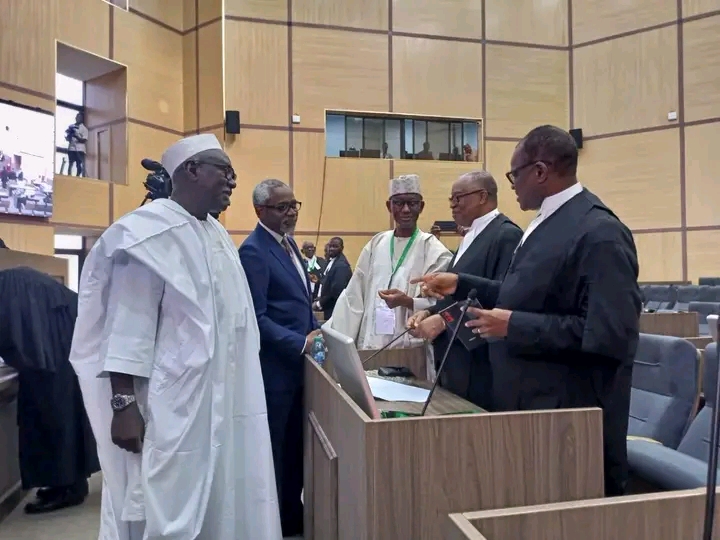AMILOADED MEDIA HUB NEWS UPDATE
In an unprecedented move, the Supreme Court, on Thursday, gave permission for its judgement in the legal dispute trailing the presidential election that was held in the country on February 25, to be televised.
The apex court gave clearance for live coverage of the proceeding, barely 15 minutes before the time (9 a.m.) that was scheduled for the Justice Inyang Okoro-led seven-man panel to commence the delivery of the judgement.
Meanwhile, there is heavy security presence within the Supreme Court which is located within the Three-Arm-Zone in the Federal Capital Territory, FCT, Abuja.
Heavily armed security operatives are stationed at every entry point to the court, with all the major access routes blocked with security vehicles.
From the main gate, both officials of the court and security agents, with long lists, verified everyone entering the premises, with those whose names were not found on the accreditation list, turned back.
Likewise, everyone entering inside the court hall were mandated to pass through a security van for scanning.
Among those already in court for the judgement, are the Minister of the FCT, Nyesom Wike, the National Security Adviser, Nuhu Ribadu, Chief of Staff to President Bola Tinubu, Femi Gbajabiamila, Chairman of the All Progressives Congress, APC, Abdullahi Ganduje, his counterparts from the Labour Party, LP, and the Peoples Democratic Party, PDP, Julius Abure and Umar Damagun, respectively, as well as President Tinubu’s son, Seyi.
The Independent National Electoral Commission, INEC, had on March 1, announced that Tinubu of the ruling All Progressives Congress, APC, won the presidential contest, ahead of 17 other candidates that participated in the poll.
It declared that he garnered a total of 8,794,726 votes to defeat his two major rivals, Alhaji Atiku Abubakar of the Peoples Democratic Party, PDP, who came second with a total of 6,984,520 votes, and Mr. Peter Obi of the Labour Party, who came third with a total of 6,101,533 votes.
However, dissatisfied with the outcome of the poll, both Obi and Atiku, alongside their political parties, initiated legal actions to invalidate it.
The duo, in separate appeals they lodged through their respective team of lawyers, challenge the return of Tinubu as the valid winner of the presidential poll.
A major plank upon which the litigants rested their cases included the claim that President Tinubu was at the time the election held, not qualified to contest.
They maintained that the election was characterized by manifest corrupt practices, substantial non-compliance with provisions of the Electoral Act 2022 and INEC’s Manual/Guidelines for the conduct of the election.
The appellants further queried Tinubu’s eligibility to occupy the presidential seat, insisting that he was previously indicted and fined the sum of $460,000.00 by the United States District Court, Northern District of Illinois, Eastern Division, in Case No: 93C 4483, for an offence involving dishonesty and drug trafficking.
According to them, such indictment, constituted a ground for disqualification under section 137 (1) (d) of the 1999 Constitution, as amended.
Besides, the petitioners stressed that Tinubu did not satisfy the provision of section 134 (2) (b) of the Constitution, as he failed to secure 25% votes in the Federal Capital Territory, Abuja.
They maintained that Tinubu did not secure the majority of valid votes that were cast during the election to be declared the winner.
Specifically, they prayed the apex court to allow their appeals and set aside the September 6 judgement of the Presidential Election Petition Court, PEPC, which not only dismissed their petitions as lacking in merit, but also affirmed President Tinubu’s victory.
Both Atiku and Obi are separately claiming that they won the election, even as they urged the court to either declare them as validly elected President or in the alternative, order a fresh or rerun poll.
A seven-man panel of the apex court led by Justice John Inyang Okoro, reserved judgement on the appeals, after all the parties adopted their respective briefs of argument last Monday.
Other members of the apex court panel that will determine the cases are; Justices Uwani Abba-Aji, Lawal Garba, Ibrahim Saulawa, Adamu Jauro, Abubakar Tijjani and Emmanuel Akomaye Agim.


Leave a Reply